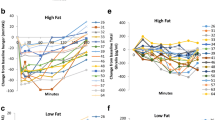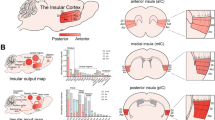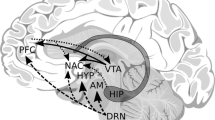Abstract
A better understanding of the etiology and pathology related to distinct subtypes of anhedonia can lead to more efficacious personalized treatments. The current study advances knowledge on consummatory anhedonia - represented in the Research Domain Criteria (RDoC) subconstruct of Initial Response to Reward (IRR). The Sweet Taste Test (STT) has promise as a behavioral paradigm for IRR, as it is sensitive to manipulation of μ-opioid receptors. However, there is a lack of existing knowledge of how the STT relates to subtypes of anhedonia, personality traits, and phases of the menstrual cycle. To address these questions, we administered the STT to 72 nonpsychiatric adults (76% women; mean age: 19.11). As predicted, the hedonic slope reflecting increasing “like” ratings over increasing concentrations of five sucrose solutions (ranging from 0.05 M to 0.86 M), was lower in individuals reporting higher consummatory anhedonia (measured with Temporal Experience of Pleasure Scales - Consummatory Subscale) and in women in the mid-to-late luteal menstrual phase (days 20 to 28). Both effects were driven by lower hedonic ratings to the sweetest concentration. The hedonic slope was larger in individuals scoring higher on the Flight-Freeze-Avoidance System personality factor from the Reinforcement Sensitivity Theory Personality Questionnaire - driven by lower hedonic ratings for the least sweet concentration. No factor or aspect from the Big Five Aspects Scale related to hedonic ratings on the STT. The STT may be a valid and specific standardized behavioral paradigm to add to IRR, particularly if validated in a large transdiagnostic psychiatric sample.




Similar content being viewed by others
References
Allen, T. A., Carey, B. E., McBride, C., Bagby, R. M., DeYoung, C. G., & Quilty, L. C. (2018). Big Five aspects of personality interact to predict depression. Journal of Personality, 86, 714–725. https://doi.org/10.1111/jopy.12352.
American Psychiatric Association. (2013). Diagnostic and statistical manual of mental disorders; DSM-5. Washington, D.C.: American Psychiatric Association.
Amiri, S., Behnezhad, S., & Azad-Marzabadi, E. (2017). Psychometric properties revised reinforcement sensitivity theory (r-RST) scale in chronic pain patients. Journal of Pain Research, 10, 1879–1885. https://doi.org/10.2147/jpr.s132133.
Arbisi, P. A., Billington, C. J., & Levine, A. S. (1999). The effect of naltrexone on taste detection and recognition threshold. Appetite, 32(2), 241–249. https://doi.org/10.1006/appe.1998.0217.
Ashton, M. C., Pilkington, A. C., & Lee, K. (2014). Do prosocial people prefer sweet-tasting foods? An attempted replication of Meier, Moeller, Riemer-Peltz, and Robinson (2012). Journal of Research in Personality, 52, 42–46. https://doi.org/10.1016/j.jrp.2014.06.006.
Bartoshuk, L. M., Duffy, V. B., Green, B. G., Hoffman, H. J., Ko, C. W., Lucchina, L. A., Marks, L. E., Snyder, D. J., & Weiffenbach, J. M. (2004). Valid across-group comparisons with labeled scales: The gLMS versus magnitude matching. Physiology & Behavior, 82(1), 109–114.
Berlin, I., Givry-Steiner, L., Lecrubier, Y., & Puech, A. J. (1998). Measures of anhedonia and hedonic responses to sucrose in depressive and schizophrenic patients in comparison with healthy subjects. European Psychiatry, 13(6), 303–309. https://doi.org/10.1016/s0924-9338(98)80048-5.
Bowen, D. J., & Grunberg, N. E. (1990). Variations in food preference and consumption across the menstrual cycle. Physiology & Behavior, 47(2), 287–291. https://doi.org/10.1016/0031-9384(90)90144-S.
Cabanac, M., & Lafrance, L. (1990). Postingestive alliesthesia: The rat tells the same story. Physiology & Behavior, 47(3), 539–543.
Carroll, M. E., Collins, M., Kohl, E. A., Johnson, S., & Dougen, B. (2016). Sex and menstrual cycle effects on chronic oral cocaine self-administration in rhesus monkeys: Effects of a nondrug alternative reward (journal article). Psychopharmacology, 233(15), 2973–2984. https://doi.org/10.1007/s00213-016-4343-5.
Castro, D. C., & Berridge, K. C. (2017). Opioid and orexin hedonic hotspots in rat orbitofrontal cortex and insula. Proceedings of the National Academy of Sciences of the United States of America, 114(43), E9125–e9134. https://doi.org/10.1073/pnas.1705753114.
Corr, P. J., & Cooper, A. J. (2016). The reinforcement sensitivity theory of personality questionnaire (RST-PQ): Development and validation. Psychological Assessment, 28(11), 1427–1440. https://doi.org/10.1037/pas0000273.
Davis, P., & Reijmers, L. G. (2018). The dynamic nature of fear engrams in the basolateral amygdala. Brain Research Bulletin, 141, 44–49.
De Pascalis, V., Fracasso, F., & Corr, P. J. (2017). The behavioral approach system and augmenting/reducing in auditory event-related potentials during emotional visual stimulation. Biological Psychology, 123, 310–323. https://doi.org/10.1016/j.biopsycho.2016.10.015.
DePoy, L. M., McClung, C. A., & Logan, R. W. (2017). Neural mechanisms of circadian regulation of natural and drug reward. Neural Plasticity, 2017, 5720842. https://doi.org/10.1155/2017/5720842.
DeYoung, C. G., Quilty, L. C., & Peterson, J. B. (2007). Between facets and domains: 10 aspects of the big five. Journal of Personality and Social Psychology, 93(5), 880–896. https://doi.org/10.1037/0022-3514.93.5.880.
DeYoung, C. G., Carey, B. E., Krueger, R. F., & Ross, S. R. (2016). Ten aspects of the big five in the personality inventory for DSM-5. Personal Disorder, 7(2), 113–123. https://doi.org/10.1037/per0000170.
Dichter, G. S., Smoski, M. J., Kampov-Polevoy, A. B., Gallop, R., & Garbutt, J. C. (2010). Unipolar depression does not moderate responses to the sweet taste test. Depression and Anxiety, 27(9), 859–863. https://doi.org/10.1002/da.20690.
Eikemo, M., Loseth, G. E., Johnstone, T., Gjerstad, J., Willoch, F., & Leknes, S. (2016). Sweet taste pleasantness is modulated by morphine and naltrexone. Psychopharmacology, 233(21–22), 3711–3723. https://doi.org/10.1007/s00213-016-4403-x.
Eiler, W. J. A., Dzemidzic, M., Soeurt, C. M., Carron, C. R., Oberline, B. G., Considine, R. V., Harezlak, J., & Kareken, D. A. (2017). Family history of alcoholism and the human brain response to oral sucrose. Neuroimage Clinical, 17, 1036–1046.
Elfhag, K., & Erlanson-Albertsson, C. (2006). Sweet and fat taste preference in obesity have different associations with personality and eating behavior. Physiology & Behavior, 88(1), 61–66. https://doi.org/10.1016/j.physbeh.2006.03.006.
Elliott, S. A., Ng, J., Leow, M. K., & Henry, C. J. (2015). The influence of the menstrual cycle on energy balance and taste preference in Asian Chinese women. European Journal of Nutrition, 54(8), 1323–1332. https://doi.org/10.1007/s00394-014-0812-y.
Evans, S. M., & Foltin, R. W. (2006). Exogenous progesterone attenuates the subjective effects of smoked cocaine in women, but not in men. Neuropsychopharmacology, 31(3), 659–674. https://doi.org/10.1038/sj.npp.1300887.
Evans, S. M., Haney, M., & Foltin, R. W. (2002). The effects of smoked cocaine during the follicular and luteal phases of the menstrual cycle in women. Psychopharmacology, 159(4), 397–406. https://doi.org/10.1007/s00213-001-0944-7.
Garbutt, J. C., Osborne, M., Gallop, R., Barkenbus, J., Grace, K., Cody, M., Flannery, B., & Kampov-Polevoy, A. B. (2009). Sweet liking phenotype, alcohol craving and response to naltrexone treatment in alcohol dependence. Alcohol and Alcoholism, 44(3), 293–300. https://doi.org/10.1093/alcalc/agn122.
Garbutt, J. C., Kampov-Polevoy, A. B., Kalka-Juhl, L. S., & Gallop, R. J. (2016). Association of the Sweet-Liking Phenotype and Craving for alcohol with the response to naltrexone treatment in alcohol dependence: A randomized clinical trial. JAMA Psychiatry, 73(10), 1056–1063. https://doi.org/10.1001/jamapsychiatry.2016.2157.
Gard, D. E., Kring, A. M., Gard, M. G., Horan, W. P., & Green, M. F. (2007). Anhedonia in schizophrenia: Distinctions between anticipatory and consummatory pleasure. Schizophrenia Research, 93(1–3), 253–260. https://doi.org/10.1016/j.schres.2007.03.008.
Gooding, D. C., & Pflum, M. J. (2014). The assessment of interpersonal pleasure: Introduction of the anticipatory and Consummatory interpersonal pleasure scale (ACIPS) and preliminary findings. Psychiatry Research, 215(1), 237–243. https://doi.org/10.1016/j.psychres.2013.10.012.
Goodman, E. L., Breithaupt, L., Watson, H. J., Peat, C. M., Baker, J. H., Bulik, C. M., & Brownley, K. A. (2017). Sweet taste preference in binge-eating disorder: A preliminary investigation. Eating Behaviors, 28, 8–15. https://doi.org/10.1016/j.eatbeh.2017.11.005.
Insel, T. R., & Cuthbert, B. N. (2015). Medicine. Brain disorders? Precisely. Science, 348, 499–500.
Insel, T., Cuthbert, B., Garvey, M., Heinssen, R., Pine, D. S., Quinn, K., Sanislow, C., & Wang, P. (2010). Research domain criteria (RDoC): Toward a new classification framework for research on mental disorders. The American Journal of Psychiatry, 167(7), 748–751. https://doi.org/10.1176/appi.ajp.2010.09091379.
Jackson, D. N. (1984). Personality Research Form Manual. Port Heron: Research Psychologists Press.
Janowsky, D. S., Pucilowski, O., & Buyinza, M. (2003). Preference for higher sucrose concentrations in cocaine abusing-dependent patients. Journal of Psychiatric Research, 37(1), 35–41.
Kampov-Polevoy, A., Garbutt, J. C., & Janowsky, D. (1997). Evidence of preference for a high-concentration sucrose solution in alcoholic men. The American Journal of Psychiatry, 154(2), 269–270. https://doi.org/10.1176/ajp.154.2.269.
Kampov-Polevoy, A. B., Tsoi, M. V., Zvartau, E. E., Neznanov, N. G., & Khalitov, E. (2001). Sweet liking and family history of alcoholism in hospitalized alcoholic and non-alcoholic patients. Alcohol and Alcoholism, 36(2), 165–170.
Kampov-Polevoy, A. B., Ziedonis, D., Steinberg, M. L., Pinsky, I., Krejci, J., Eick, C., Boland, G., Khalitov, E., & Crews, F. T. (2003). Association between sweet preference and paternal history of alcoholism in psychiatric and substance abuse patients. Alcoholism, Clinical and Experimental Research, 27(12), 1929–1936. https://doi.org/10.1097/01.alc.0000099265.60216.23.
Kaye, S. A., White, M. J., & Lewis, I. (2018). Young females' attention toward road safety images: An ERP study of the revised reinforcement sensitivity theory. Traffic Injury Prevention, 19(2), 201–206. https://doi.org/10.1080/15389588.2017.1369531.
Kikuchi, Y., & Watanabe, S. (2000). Personality and dietary habits. Journal of Epidemiology, 10(3), 191–198.
Lange, L. A., Kampov-Polevoy, A. B., & Garbutt, J. C. (2010). Sweet liking and high novelty seeking: Independent phenotypes associated with alcohol-related problems† (article). Alcohol and Alcoholism, 45(5), 431–436. https://doi.org/10.1093/alcalc/agq040.
Langleben, D. D., Busch, E. L., O'Brien, C. P., & Elman, I. (2012). Depot naltrexone decreases rewarding properties of sugar in patients with opioid dependence. Psychopharmacology, 220(3), 559–564. https://doi.org/10.1007/s00213-011-2503-1.
Lee, C. W., & Ho, I. K. (2013). Sex differences in opioid analgesia and addiction: Interactions among opioid receptors and estrogen receptors. Molecular Pain, 9, 45.
McCabe, C., Mishor, Z., Cowen, P. J., & Harmer, C. J. (2010). Diminished neural processing of aversive and rewarding stimuli during selective serotonin reuptake inhibitor treatment. Biological Psychiatry, 67(5), 439–445. https://doi.org/10.1016/j.biopsych.2009.11.001.
Meier, B. P., Moeller, S. K., Riemer-Peltz, M., & Robinson, M. D. (2012). Sweet taste preferences and experiences predict prosocial inferences, personalities, and behaviors. Journal of Personality and Social Psychology, 102(1), 163–174. https://doi.org/10.1037/a0025253.
Mello, N. K., Negus, S. S., Knudson, I. M., Kelly, M., & Mendelson, J. H. (2008). Effects of estradiol on cocaine self-administration and cocaine discrimination by female rhesus monkeys. Neuropsychopharmacology, 33, 783–795.
Mello, N. K., Knudson, I. M., Kelly, M., Fivel, P. A., & Medelson, J. H. (2011). Effects of progesterone and testosterone on cocaine self-administration and cocaine discrimination by female rhesus monkeys. Neuropsychopharmacology, 36, 2187–2199.
Mulligan, E. M., Nelson, B. D., Infantolino, Z. P., Luking, K. R., Sharma, R., & Hajcak, G. (2018). Effects of menstrual cycle phase on electrocortical response to reward and depressive symptoms in women. Psychophysiology, 55, e13268. https://doi.org/10.1111/psyp.13268.
Quilty, L. C., DeYoung, C. G., Oakman, J. M., & Bagby, R. M. (2014). Extraversion and behavioral activation: Integrating the components of approach (Article). Journal of Personality Assessment, 96(1), 87–94. https://doi.org/10.1080/00223891.2013.834440.
Reynolds, W. (1982). Development of reliable and valid short forms of the Marlowe-Crowne social desirability scale. Journal of Clinical Psychology, 38(1), 119–125.
Sagioglou, C., & Greitemeyer, T. (2016). Individual differences in bitter taste preferences are associated with antisocial personality traits. Appetite, 96, 299–308. https://doi.org/10.1016/j.appet.2015.09.031.
Saliba, A. J., Wragg, K., & Richardson, P. (2009). Sweet taste preference and personality traits using a white wine (Article). Food Quality and Preference, 20(8), 572–575. https://doi.org/10.1016/j.foodqual.2009.05.009.
Schroeder, J. A., Niculescu, M., & Unterwald, E. M. (2003). Cocaine alters mu but not delta or kappa opioid receptor-stimulated in situ [35S]GTPgammaS binding in rat brain. Synapse, 47(1), 26–32. https://doi.org/10.1002/syn.10148.
Sena-Esteves, M. M., Mota, M., & Malfeito-Ferreira, M. (2018). Patterns of sweetness preference in red wine according to consumer characterisation (Article). Food Research International, 106, 38–44. https://doi.org/10.1016/j.foodres.2017.12.043.
Snaith, R. P., Hamilton, M., Morley, S., Humayan, A., Hargreaves, D., & Trigwell, P. (1995). A scale for the assessment of hedonic tone the Snaith-Hamilton pleasure scale. The British Journal of Psychiatry, 167(1), 99–103.
Strauss, G. P., & Cohen, A. S. (2017). A transdiagnostic review of negative symptom phenomenology and etiology. Schizophrenia Bulletin, 43, 712–719.
Sofuoglu, M., Dudish-Poulsen, S., Nelson, D., Pentel, P. R., & Hatsukami, D. K. (1999). Sex and menstrual cycle differences in the subjective effects from smoked cocaine in humans. Experimental and Clinical Psychopharmacology, 7(3), 274–283.
Treadway, M. T., & Zald, D. H. (2011). Reconsidering anhedonia in depression: Lessons from translational neuroscience. Neuroscience and Biobehavioral Reviews, 35(3), 537–555. https://doi.org/10.1016/j.neubiorev.2010.06.006.
Tsypes, A., Owens, M., Hajcak, G., & Gibb, B. E. (2018). Neural reward responsiveness in children who engage in nonsuicidal self-injury: an ERP study. Journal of Child Psychology and Psychiatry, 59, 1289–1297. https://doi.org/10.1111/jcpp.12919.
Tucci, S. A., Murphy, L. E., Boyland, E. J., Dye, L., & Halford, J. C. (2010). Oral contraceptive effects on food choice during the follicular and luteal phases of the menstrual cycle. A laboratory based study. Appetite, 55(3), 388–392. https://doi.org/10.1016/j.appet.2010.06.005.
Vittengl, J. R., Clark, L. A., Thase, M. E., & Jarrett, R. B. (2015). Predictors of longitudinal outcomes after unstable response to acute-phase cognitive therapy for major depressive disorder. Psychotherapy (Chicago, Ill.), 52(2), 268–277. https://doi.org/10.1037/pst0000021.
Weafer, J., Burkhardt, A., & de Wit, H. (2014). Sweet taste liking is associated with impulsive behaviors in humans. Frontiers in Behavioral Neuroscience, 8, 228. https://doi.org/10.3389/fnbeh.2014.00228.
Weafer, J., Lyon, N., Hedeker, D., & de Wit, H. (2017). Sweet taste liking is associated with subjective response to amphetamine in women but not men. Psychopharmacology, 234(21), 3185–3194. https://doi.org/10.1007/s00213-017-4702-x.
Wronski, M., Skrok-Wolska, D., Samochowiec, J., Ziolkowski, M., Swiecicki, L., Bienkowski, P., et al. (2007). Perceived intensity and pleasantness of sucrose taste in male alcoholics. Alcohol and Alcoholism, 42(2), 75–79. https://doi.org/10.1093/alcalc/agl097.
Acknowledgments
The authors would like to thank the following research assistants for their help on this project: Ashley Lee Lum, Pamela Askins, Doniya Milani, Jasmine Montero, Nicholas Picanso, and Brooke Fenton.
Author information
Authors and Affiliations
Corresponding author
Ethics declarations
Conflict of Interest
Jeffrey S. Bedwell, Christopher C. Spencer, Cristina A. Chirino, and John P. O’Donnell report no conflicts of interest related to this manuscript and study.
Experiment Participants
Research followed ethical principles described in the Declaration of Helsinki.
Ethical Approval
This study was approved by the Institutional Review Board of the University of Central Florida (IRB #: SBE-16-12,678).
Informed Consent
All participicipants provided informed consent for both the online and laboratory portions of this study.
Additional information
Publisher’s Note
Springer Nature remains neutral with regard to jurisdictional claims in published maps and institutional affiliations.
Rights and permissions
About this article
Cite this article
Bedwell, J.S., Spencer, C.C., Chirino, C.A. et al. The Sweet Taste Test: Relationships with Anhedonia Subtypes, Personality Traits, and Menstrual Cycle Phases. J Psychopathol Behav Assess 41, 235–248 (2019). https://doi.org/10.1007/s10862-019-09717-2
Published:
Issue Date:
DOI: https://doi.org/10.1007/s10862-019-09717-2




